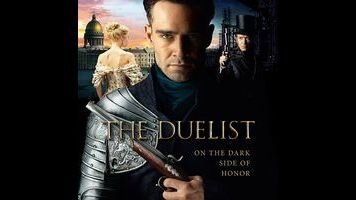Expensive-ish (by Russian standards, anyway) and claustrophobic, Aleksei Mizgirev’s The Duelist resembles an unholy cross of the worst of Tom Hooper and Zack Snyder—and worse yet, it’s mostly diverting. Stalingrad’s Pyotr Fyodorov plays Yakovlev, a disgraced nobleman who returns to mid-19th century Saint Petersburg as a hired gun. Yakovlev is one of those black-clad antiheroes who spends much of his time reminding the viewer that he’s an antihero. He is a man with a dark past, a sharpshooter (his signature trick is blowing a shot glass off his own head with a ricocheted bullet), and a contract killer. Paid by unknown conspirators, he provokes noblemen into deadly duels with the help of a nameless German accomplice (Martin Wuttke).
The premise of intrigue and revenge in a high-society Tsarist underworld is irresistible and pulpy, but Mizgirev’s script is an indigestible, soap-operatic mess of backstories, clichés, and the kind of ambiguous mystic overtones that have become an unbreakable addiction for Russian film. Given a supernatural destiny by Aleut tribesmen, Yakovlev has come back from exile to clear his name (which isn’t really Yakovlev), only to become involved with the machinations of the villainous and bankrupt Count Beklemishev (Vladimir Mashkov), who wants to marry the comely heiress Marfa Tuchkova (Yuliya Khlynina) for her money, but is also carrying on an affair with Grand Duchess Alexandra (Franziska Petri). The latter is a historical figure whose direct descendants include the current heirs to the British crown.
If this plot’s tangle of Euro-Russian relations, financial debts, and fates is supposed to be a metaphor, it hasn’t been thought through. But Mizgirev, who is best known for bleak exercises like Tambourine, Drum and The Convoy, has somehow figured out how to make a visually incoherent movie without resorting to quick cuts. The Duelist is being distributed in IMAX, and its aesthetic is all oomph: inertly acted, bombastically scored, and filmed from low and canted angles on sets so cavernous and so lavished with decay and water damage that much of the action appears to take place underground. That a movie called The Duelist can’t get two shots of men pointing flintlock pistols at each other to match appears to be a secondary concern; Mizgirev is more interested in his collection of fetish-wear-esque period costumes, rain machines, crumbling textures, gruesome injuries, and self-loathing sex scenes.
Unlike Christophe Gans’ 18th century martial-arts-horror hybrid The Brotherhood Of The Wolf, which similarly tried to sex up an era usually reserved for middlebrow costume dramas, The Duelist refuses to acknowledge fun. It is humorless and portentous. But can something so overwrought, so far off the deep end of macho fantasy really be called boring? Bringing to mind an imperfect clone of Colin Farrell cruelly robbed of the ability to smile, Fyodorov glowers, broods, and furrows his thick eyebrows through every scene. Duels staged behind paper screens, unfeasible secret conspiracies and identities, con games based on aristocratic honor—it’s The Duelist’s inability to recognize its own ludicrousness that makes it, in spots, delectable as camp.

